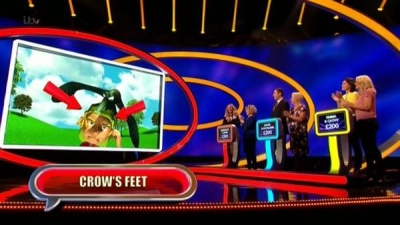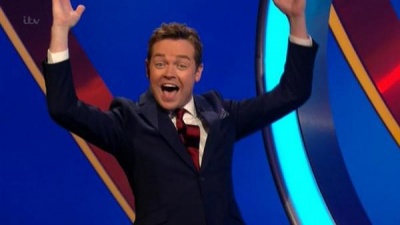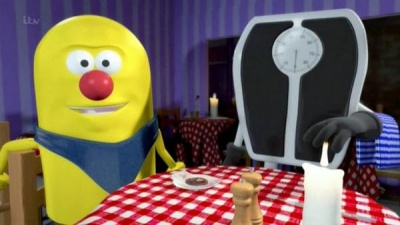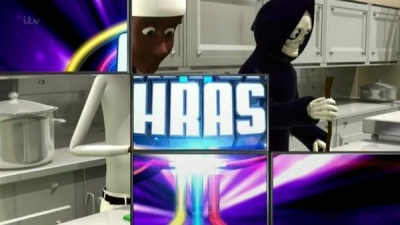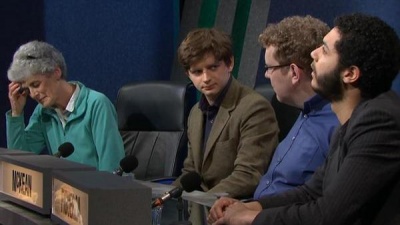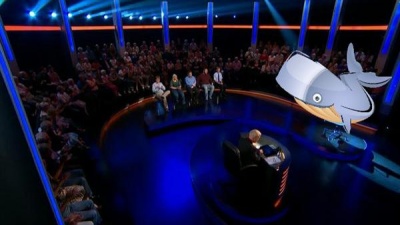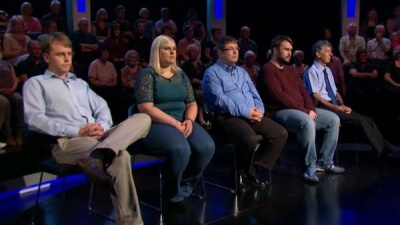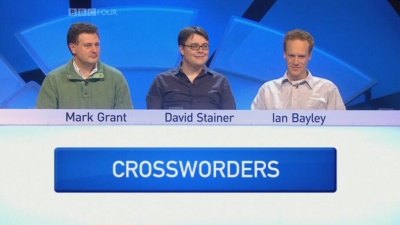Weaver's Week 2014-04-06
Last Week | Weaver's Week Index | Next Week
This week, we heard that Bruce Forsyth is to leave Strictly Come Dancing. Well, he'll leave most shows, but will still turn up to deliver his annual Christmas Message to the Common Wealth. We wish him a long and healthy semi-retirement.
Our feature review this week is a show that is almost as long-running as Brucie.
Contents |
Catchphrase
DRG and STV for ITV
It's almost three decades since Roy Walker and TVS first brought Catchphrase to our television screens. The idea is tremendously simple: an animation is shown on screen, it's meant to give an indication of a well-known phrase or saying. Contestants buzz in with their guesses. Right answers win cash. And that's about it.
Catchphrase is most closely associated with original host Roy Walker, who had to come up with a million ways of saying that an answer was wrong. He was with the show for over a decade. Andrew O'Connor presented a parent-and-child edition on The Family Channel, and then the hosts went downhill. Nick Weir (who? Exactly!) presented a couple of series on ITV primetime, and Mark Curry hosted a daytime version with prizes even smaller than O'Connor's version.
And there the story stopped. A fifteen-year run, most of the episodes got shown on repeats channels. Roy Walker went on to do a regular feature on Chris Moyles's radio show, Mark Curry worked on tennis and acting, and Nick Weir is missing, presumed solving mysteries with his uncle.
The story stopped, but then the recession hit, and continued hitting. ITV came up with a survival strategy: recommission old shows with as few tweaks as possible. So Ant and Dec brought back Saturday Night Takeaway Your Money, there was a revival of The Krypton Factor, and a new run of Catchphrase.
A paper description of the format shows how it's faithful to the original: decode the catchphrase for £100, solve the bonus catchphrase (revealed one-ninth at a time) for £500. Later rounds go for £200 and a bonus of £1000, with £500 on offer in the final dash to the buzzer. We'll get to the final round later.
But before the earning can begin, civilian contestants must prove their ability. The Catchphrase set suffers from lax security, absolutely anyone can wander in and take their place at a podium. So, to weed out the intellectual chaff from the chaffier, there's a qualifying round. Some catchphrases are shown, and three contestants buzz in to solve them. First players to get three right will make it to the money game.
The last player goes home. Defeated. With nothing more than an audience's sycophantic applause in their ears. They came here in confidence, but leave a humiliated loser.
Stephen Mulhern is the host here, and there are times when he could be replaced by the SM:TV:2000 Autohost. All too often, its patter runs from one cliché to the next. "Here comes your clue", says the SM:TVbot, just before the giveaway bit of the computer animation. "It's on the screen but what does it mean?" continues the bot whenever there's a gap to fill.
"Just see it and say it." "Will the middle solve the riddle," asks the SM:TVbot about the bonus catchphrases. "Here's the clue!" "Is that a catchphrase?", it wonders of wrong answers. "Keep pressin' an' guessin'." And the oh-so-catchy, "Just remove the square, will she solve the catchphrase?"
The computer animations on Catchphrase have always been of their time. In the mid-1980s, it was enough for a cartoon character to appear on a blue background, sitting on a fluffy white seat that pulled back to be a cloud, and the cloud to be in the shape of a number 9. By the mid-1990s, viewers expected more complex animations. By now, they need to be realistic, but they still need to be animations – those seen on Catchphrase are still computer-generated, now with bounce and drop shadows and bodies slightly out-of-proportion. Films such as Toy Story and Shrek are clear inspirations.
The computer generated characters include Mr. Chips. He's one of the few things to come across from the North American original, and we reckon Herbie was originally created as a general human being for scenes that were too complex to animate with proper people. This problem had gone away by the end of the century, and Chips was replaced by a family of humanoid characters. He didn't have to return in the revival, but he did, purely as something for the nostalgia audience. The original theme music was also brought back, albeit in a remixed form.
Computer characters don't actually include the SM:TVbot. Stephen is a real person, and from time to time he will smash through the fourth wall and directly address the audience at home. For our money, these are the best moments of the show.
Catchphrase has a dark secret, it can actually be quite dull. Here is a picture, hinting at a saying. Buzz in and decode it. When everything goes right, that can be monotonous: picture, buzz, answer, bonus round, rinse, repeat. The errors make the programme. They let the viewer feel smug and think, "Of course it was 'age before beauty'. How did they not get that?" And they give some relief, an excuse to snap out of SM:TVbot mode and give some genuine responses.
From time to time, we get the impression that the producers are trying a bit too hard. The classic moment of funny from the original series was a bonus catchphrase, to which the answer is "Snake charmer". The clue was Mr Chips gently rocking back and forth while simultaneously grinning, raising his top hat, and closing one eye. From a certain angle it looked like he was doing something else entirely. The audience began to titter, and then to guffaw, and eventually they were laughing hysterically. Roy Walker was on the verge of bursting out laughing himself, and finally broke when the head of a snake popped out.
This series, the producers tried to recreate this pandemonium, on the saying "Dicing with death". First square reveals a hand going up and down very quickly. Celebrity player David Walliams covers his mother's eyes, and when Kimberley Walsh asks what's behind the squares, Stephen pretends to peek behind the squares and says "You don't want to know". The joke is milked for all it is worth. We see a person's head showing a fixed grin, and the audience laughs loudly. Then a skull appears, and the laugh track is turned up to eleven.
The problem is that they've arranged for this to happen, it's planned and not spontaneous, and the humour in "Snake charmer" arose from the audience spontaneously drawing their own conclusions about what Mr. Chips is doing. In "Dicing with death", the contestants and the host lay it on with a trowel. That's a shame, because Catchphrase can be an entertaining watch, more fun than competition.
That's apart from the final round. Five catchphrases in one minute will win the jackpot of £50,000, and apparently they're graded from easy to hard. The phrases are arranged in a pyramid, starting with five easy animations and finishing with one fiendishly difficult one. There are other prizes along the way, including a holiday to somewhere exotic in a particular square on the third level. For this couple of minutes, Stephen does get suitably serious and intense, and relaxes again for the closing goodbyes.
There's nothing actually wrong with the Catchphrase revival, there's certainly nothing wrong with ITV throwing a big money feelgood quiz on Sunday nights – indeed, for much of its run, that was the regular slot. And we're fine with the show casting people as much for their presence on screen as for their intellect: it's a game anyone can play, and that anyone does play.
The main reason why this column doesn't watch Catchphrase is simply that it doesn't really appeal enough for us to see every episode. Save it for an occasional treat, make every episode special. Less is more.
University Challenge
Group Phase 5, Match L: Somerville Oxford v SOAS
"The penultimate match in this series," notes our host Jeremy "Thumper" Paxman. To be brutal, it's been a struggle at times this year, the extended group phase just seems to potter along aimlessly and the semi-finals (of which this is the second) are gone in a flash. Surely there's a better tournament structure than this. Somerville have won all their matches so far, SOAS were tripped up by Trinity Cambridge in phase 3.
In the game, Somerville trip over themselves, dropping to minus-10 while SOAS accept the first three starters. The Oxford side comes well in the first visual rounds, representations of European parliaments, cutting SOAS's lead to 55-30. On a roll, Somerville quickly takes two more starters for the lead, and it looks like they're set for the win.
Nothing on University Challenge is ever simple. Somerville pick up a missignal, SOAS pick it up, but the bonuses are hard and they can only draw level. Music of the macabre is the audio round, after which Somerville leads by 85-70. In what felt at the time like a key buzz, SOAS suggest a fan of Lenin's was Trotsky, but Somerville are correct with Stalin. In what felt like an out-take from The Technical Difficulties, Somerville suggest that a muscle in the eye is the "optical sphincter".
SOAS pick up a missignal of their own, and Somerville extend the lead to 50. And then they switch on the afterburners, making it 135-65 at the visual round (Renaissance pictures of feasts), and though SOAS get a set of their own, we get the feeling that Somerville are just a little too far ahead. Particularly when one of the SOAS team suggests that the hexadecimal number 251 is a representation of the BBC. Er, no. At the gong, Somerville has won by 190-105.
It was a slow match: just 73 questions, compared to last week's 88. Somerville's bonus rate was 19/33, their total for the series so far is 107/170. We can only see the Oxford side beating Trinity Cambridge if they're consistently better on the buzzers, because Trinity is better on the bonuses.
Mastermind
Second round, match 4
"I've never seen a whale on Mastermind," said one of the contributors to this week's Technical Difficulties podcast.
- Andries van Tonder (Black Sabbath 1968-79) takes the band Ozzy Osbourne was in before he became famous. An error at the end leaves him on 10 (0).
- Beth Webster (Novels of Barbara Vine), the alter ego of novelist Ruth Rendell. The contender gets the rough end of a couple of questions, finishing on 7 (1).
- Colin Foster (Life and Times of William II) includes a question to which the answer involves liquid excreta. Corks, they'll be inviting Dick and Dom next. It's a Perfect Round! 12 (0)
- Ben Holmes (Adolf Hitler) scores 6 (0) on a subject we can't talk about without getting very sweary.
- Hamish Cameron (Life and Works of Paulo Veronese) answers very quickly on the Venetian painter, closing on 11 (0).
Ben Holmes got here with the Manic Street Preachers on 31 January. His successful general knowledge round closes on 19 (0). Beth Webster is this week's runner-up, having finishes second on 9 August with the Muppet films. 13 (4) here.
Andries is this year's third-place qualifier, he finished third in the Valentine's Day Qualifier with Rhodesia. Here, he starts strongly, but falls down towards the end. 16 (1) isn't going to take him further.
Hamish Cameron won his heat with Ramsey McDonald on 30 August. It's the fifth (count 'em!) series of Mastermind he's graced, never quite making a final. He has a strong general knowledge, closing on 22 (1). We do recommend a close look at the Hilary and Jackie film, though.
Colin Foster took gold with Olympic medal winners on 16 August. Needing twelve to be sure of the win, he starts strongly, but then stops scoring almost completely. He picks up a little speed towards the end, but doesn't quite make it. 19 (0).
Which means that, at the fifth time of asking, Hamish Cameron is in the Mastermind final. Hats off, sir!
This Week and Next
The Brain of Britain final this week. There was very little to choose between the players in the opening round, though we felt that Azeez Feshitan was a bit lucky with a couple of his answers. On the other hand, he got them right, so he quite clearly knew them. Mark Grant continued with his policy of picking up lots of bonuses, but not scoring tremendously well on his own questions. Clearly, we're on for a struggle, to be decided by a small margin.
And in the next round, Mark Grant scored tremendously well on his own questions, getting five in a row and a bonus mark. Dag Griffiths had been quiet in the opening rounds, but very nearly scored a five on his own; the fact that the royal yacht Britannia was the last Navy ship to have hammocks evaded the panel. David Hesp had been quiet in the first half, but made his move in a low-scoring round four.
Mark Grant led by three points, and round five proved to be even lower-scoring. David Hesp again led the way, scoring five of the seven points. Mark Grant picked up a bonus, extending his lead to two points over Mr. Hesp, five over the others. In the final round, Azeez Feshitan missed his starter, so cannot win. Mark Grant scored one, Dag Griffiths one on his own, but yielded a bonus to Mr. Grant. David Hesp needed five to win, but missed his music opener.
All of which means that Mark Grant is the Brain of Britain for 2014. He comes back in the autumn to play Ray Ward and Barry Simmons in the Brain of Brains championship match, which we think will be broadcast on 22 December. The winner will return in 2018 for Top Brain, where he will meet Ian Bayley.
BARB ratings in the week to 23 March.
- Three shows tied for top spot: Monday's Eastenders, Monday's Coronation Street, and the main Sport Relief show on Friday. Top game was The Voice with 7.15m seeing the live quarter-final.
- Saturday Night Takeaway ran hard, with 6.35m seeing Ant and Dec. Then it's a long gap to The Cube on 3.8m viewers.
- Sewing Bee had 3.35m stitched to their seat, with 3.15m for University Challenge.
- Channel 4's biggest game was 8 Out of 10 Cats, which finished level with Celebrity Juice on 1.28m.
- Only Connect (750,000) finished well behind Hair (965,000).
It's Puzzled Pint this week, details on puzzledpint.com from 7pm on Monday. And if the cryptic tests of knowledge and logic aren't enough, we understand that there will be a brief tribute to the late Mel Smith. "Root beer, anyone?"
If we had a pound for every time someone said, "Why don't they bring Fifteen-to-One back?", we'd have enough to buy a pint. Assuming you missed it yesterday, find out what did happen when they brought Fifteen-to-One back (C4, 4.30 weekdays). University Challenge has its finals (boating, BBC1 4.30 Sunday; quizzing, BBC2 8pm Monday). Also the final of The Great British Sewing Bee (BBC2, 8pm Tuesday).
With CJ away to brush up his geography, we've the return of the Eggheads (BBC2, 6pm Monday), Great British Menu (BBC2, 7.30 weekdays), and classic The Chase comes to the Challenge channel (8pm weekdays). And new runs of The 3rd Degree (R4, 3pm Monday), The Unbelievable Truth (R4, 6.30 Monday), and Sweat the Small Stuff (BBC3, 10pm Tuesday).
Next Saturday has Britain's Got Talent 2014 (ITV, 7.15) up against In It to Win It (BBC1, 7.50) and Pointless 1970s (BBC1, 7pm) Ed Stewart, Sally James, Rick Wakeman, and Madeline Smith off of every Clive Doig show! Later, Amazing Greys (ITV, 8.30) continues the battle of the ages, and we have no clue what happens on The Guess List (BBC1, 9.30).
And! It's the second edition of Schlag den Baar, a home-brewed game show you watch on the web. Undefeated SdB champion Daniel Peake takes on a Mystery Challenger in fifteen challenges that will test them mentally, physically, and psychologically. More at Bother's Bar, we expect kick-off around 8pm Saturday.
Photo credits: STV/DRG, Granada, BBC Salford, Presentable/RDF. "You came here in confidence, but leave a humiliated loser" © Brig Bother 2014.
To have Weaver's Week emailed to you on publication day, receive our exclusive TV roundup of the game shows in the week ahead, and chat to other ukgameshows.com readers, sign up to our Yahoo! Group.


